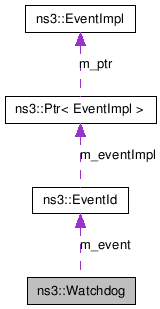ns3::Watchdog Class Reference
[Simulator]
a very simple watchdog
More...
#include <watchdog.h>
Collaboration diagram for ns3::Watchdog:

Public Member Functions | |
| void | Ping (Time delay) |
| template<typename FN > | |
| void | SetFunction (FN fn) |
| template<typename MEM_PTR , typename OBJ_PTR > | |
| void | SetFunction (MEM_PTR memPtr, OBJ_PTR objPtr) |
| template<typename T1 > | |
| void | SetArguments (T1 a1) |
| template<typename T1 , typename T2 > | |
| void | SetArguments (T1 a1, T2 a2) |
| template<typename T1 , typename T2 , typename T3 > | |
| void | SetArguments (T1 a1, T2 a2, T3 a3) |
| template<typename T1 , typename T2 , typename T3 , typename T4 > | |
| void | SetArguments (T1 a1, T2 a2, T3 a3, T4 a4) |
| template<typename T1 , typename T2 , typename T3 , typename T4 , typename T5 > | |
| void | SetArguments (T1 a1, T2 a2, T3 a3, T4 a4, T5 a5) |
| template<typename T1 , typename T2 , typename T3 , typename T4 , typename T5 , typename T6 > | |
| void | SetArguments (T1 a1, T2 a2, T3 a3, T4 a4, T5 a5, T6 a6) |
Detailed Description
a very simple watchdogIf you don't ping the watchdog sufficiently often, it triggers its listening function.
Member Function Documentation
| void ns3::Watchdog::Ping | ( | Time | delay | ) |
- Parameters:
-
delay the watchdog delay
template<typename T1 , typename T2 , typename T3 , typename T4 , typename T5 , typename T6 >
| void ns3::Watchdog::SetArguments | ( | T1 | a1, | |
| T2 | a2, | |||
| T3 | a3, | |||
| T4 | a4, | |||
| T5 | a5, | |||
| T6 | a6 | |||
| ) | [inline] |
- Parameters:
-
a1 the first argument a2 the second argument a3 the third argument a4 the fourth argument a5 the fifth argument a6 the sixth argument
References NS_FATAL_ERROR.
template<typename T1 , typename T2 , typename T3 , typename T4 , typename T5 >
| void ns3::Watchdog::SetArguments | ( | T1 | a1, | |
| T2 | a2, | |||
| T3 | a3, | |||
| T4 | a4, | |||
| T5 | a5 | |||
| ) | [inline] |
- Parameters:
-
a1 the first argument a2 the second argument a3 the third argument a4 the fourth argument a5 the fifth argument
References NS_FATAL_ERROR.
template<typename T1 , typename T2 , typename T3 , typename T4 >
| void ns3::Watchdog::SetArguments | ( | T1 | a1, | |
| T2 | a2, | |||
| T3 | a3, | |||
| T4 | a4 | |||
| ) | [inline] |
- Parameters:
-
a1 the first argument a2 the second argument a3 the third argument a4 the fourth argument
References NS_FATAL_ERROR.
template<typename T1 , typename T2 , typename T3 >
| void ns3::Watchdog::SetArguments | ( | T1 | a1, | |
| T2 | a2, | |||
| T3 | a3 | |||
| ) | [inline] |
- Parameters:
-
a1 the first argument a2 the second argument a3 the third argument
References NS_FATAL_ERROR.
template<typename T1 , typename T2 >
| void ns3::Watchdog::SetArguments | ( | T1 | a1, | |
| T2 | a2 | |||
| ) | [inline] |
- Parameters:
-
a1 the first argument a2 the second argument
References NS_FATAL_ERROR.
template<typename T1 >
| void ns3::Watchdog::SetArguments | ( | T1 | a1 | ) | [inline] |
- Parameters:
-
a1 the first argument
References NS_FATAL_ERROR.
template<typename MEM_PTR , typename OBJ_PTR >
| void ns3::Watchdog::SetFunction | ( | MEM_PTR | memPtr, | |
| OBJ_PTR | objPtr | |||
| ) | [inline] |
- Parameters:
-
memPtr the member function pointer objPtr the pointer to object
template<typename FN >
| void ns3::Watchdog::SetFunction | ( | FN | fn | ) | [inline] |
The documentation for this class was generated from the following file:
- src/simulator/watchdog.h
 1.5.8
1.5.8